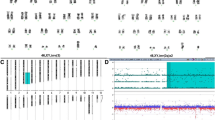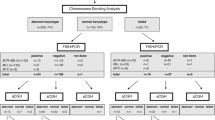Abstract
Deletion of the long arm of chromosome 20 is a common abnormality underlying hematological malignancy. We analyzed 21 patients with hematologic diseases confirmed to carry the del(20q) by conventional cytogenetics and fluorescence in situ hybridization using microarray comparative genomic hybridization (aCGH). Seventeen patients were positive for del(20q), but this deletion was not detected in four patients. All deletions detected were interstitial of which continuous deletions were seen in 12 patients and discrete deletions in five. Three commonly deleted regions (CDRs) and two commonly retained regions (CRRs) were defined: CDR1 spanning 3.05Mb (34560497-37608229) within 20q11.23, CDR2 spanning 1.76Mb (37851501-39615698) within 20q12, CDR3 spanning 116Kb (48120412-48236791) within 20q13.13, CRR1 spanning 1.1Mb (29374726-30428250) within 20q11.21, and CRR2 spanning 2.5Mb (60484668-62963548) within 20q13.33. Duplications of retained regions (20q11.21) were found in five cases with similar erythroid hyperplasia (2 M6, 3 MDS). Moreover, duplication of 20p13-p11.21 was also found in two cases with M6. Using the CDRs and CRRs, we identified the candidate genes we searched for using the UCSC Genome Browser. Our data suggest that aCGH analysis is useful for more precisely defining breakpoints on 20q. Further work is required to identify candidate pathogenic genes within these CDRs and CRRs.



Similar content being viewed by others
References
Mitelman F, Mertens F, Johansson B. A breakpoint map of recurrent chromosomal rearrangements in human neoplasia. Nat Genet. 1997;15:417–74.
Dewald GW, Schad CR, Lilla VC. Frequency and photographs of HGM11 chromosome anomalies in bone marrow samples from 3,996 patients with malignant hematologic neoplasms. Cancer Genet Cytogenet. 1993;68(1):60–9.
White NJ, Nacheva E, Asimakopoulos FA, Bloxham D, Paul B, Green AR. Deletion of chromosome 20q in myelodysplasia can occur in a multipotent precursor of both myeloid cells and B cells. Blood. 1994;83(10):2809–16.
Huret JL (2009) Genetics DIM. Available at: http://atlasgenetics.oncology.org/index.html.
Mitelman F, Johansson B, Mertens F (2009) Mitelman database of chromosome aberrations in cancer. Available at: http://cgap.nci.nih.gov/chromosomes/mitelman.
Nacheva E, Holloway T, Carter N, Grace C, White N, Green AR. Characterization of 20q deletions in patients with myeloproliferative disorders or myelodysplastic syndromes. Cancer Genet Cytogenet. 1995;80(2):87–94.
Douet-Guilbert N, Basinko A, Morel F, Le Bris MJ, Ugo V, Morice P, Berthou C, De Braekeleer M. Chromosome 20 deletions in myelodysplastic syndromes and Philadelphia-chromosome-negative myeloproliferative disorders: characterization by molecular cytogenetics of commonly deleted and retained regions. Ann Hematol. 2008;87(7):537–44.
Roulston D, Espinosa R, Stoffel M, Bell GI, Le Beau MM. Molecular genetics of myeloid leukemia: identification of the commonly deleted segment of chromosome 20. Blood. 1993;82(11):3424–9.
Asimakopoulos FA, White NJ, Nacheva E, Green AR. Molecular analysis of chromosome 20q deletions associated with myeloproliferative disorders and myelodysplastic syndromes. Blood. 1994;84(9):3086–94.
Bench AJ, Nacheva EP, Hood TL, Holden JL, French L, Swanton S, Champion KM, Li J, Whittaker P, Stavrides G, Hunt AR, Huntly BJ, Campbell LJ, Bentley DR, Deloukas P, Green AR. Chromosome 20 deletions in myeloid malignancies: reduction of the common deleted region, generation of a PAC/BAC contig and identification of candidate genes. UK Cancer Cytogenetics Group (UKCCG). Oncogene. 2000;19(34):3902–13.
Wang PW, Iannantuoni K, Davis EM, Espinosa R, Stoffel M, Le Beau MM. Refinement of the commonly deleted segment in myeloid leukemias with a del(20q). Genes chromosomes cancer. 1998;21(2):75–81.
Solinas-Toldo S, Lampel S, Stilgenbauer S, Nickolenko J, Benner A, Döhner H, Cremer T, Lichter P. Matrix-based comparative genomic hybridization:biochips to screen for genomic imbalances. Genes Chromosomes Cancer. 1997;20(4):399–407.
Okada M, Suto Y, Hirai M, Shiseki M, Usami A, Okajima K, Teramura M, Mori N, Motoji T. Microarray CGH analyses of chromosomal 20q deletions in patients with hematopoietic malignancies. Cancer Genet. 2012;205(1–2):18–24.
Huh J, Tiu RV, Gondek LP, O’Keefe CL, Jasek M, Makishima H, Jankowska AM, Jiang Y, Verma A, Theil KS, McDevitt MA, Maciejewski JP. Characterization of Chromosome Arm 20q abnormalities in myeloid malignancies using genome-wide single nucleotide polymorphism array analysis. Genes Chromosomes Cancer. 2010;49:390–9.
Simons A, Shaffer LG, Hastings RJ. Cytogenetic Nomenclature: Changes in the ISCN 2013 Compared to the 2009 Edition. Cytogenet Genome Res. 2013;141(1):1–6.
Li T, Xue Y, Wu Y, Pan J. Clinical and molecular cytogenetic studies in seven patients with myeloid diseases characterized by i(20q-). Br J Haematol. 2004;125(3):337–42.
Mackinnon RN, Selan C, Wall M, Baker E, Nandurkar H, Campbell LJ. The paradox of 20q11.21 amplification in a subset of cases of myeloid malignancy with chromosome 20 deletion. Genes Chromosomes Cancer. 2010;49(11):998–1013.
Gurvich N, Perna F, Farina A, Voza F, Menendez S, Hurwitz J, Nimer SD. L3MBTL1 polycomb protein, a candidate tumor suppressor in del(20q12) myeloid disorders, is essential for genome stability. Proc Natl Acad Sci USA. 2010;107(52):22552–7.
Author information
Authors and Affiliations
Corresponding author
Ethics declarations
Funding source
This research was supported in part by grant from National Natural Science Foundation of China (Youth National Natural Science Foundation of China) (81100332).
Conflict of interest
The authors have no conflicts of interest to disclose.
About this article
Cite this article
Wu, C., Pan, J., Qiu, H. et al. Microarray CGH analysis of hematological patients with del(20q). Int J Hematol 102, 617–625 (2015). https://doi.org/10.1007/s12185-015-1872-3
Received:
Revised:
Accepted:
Published:
Issue Date:
DOI: https://doi.org/10.1007/s12185-015-1872-3




